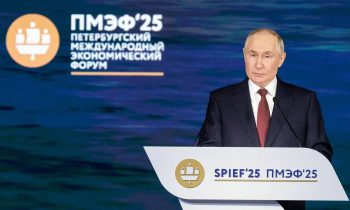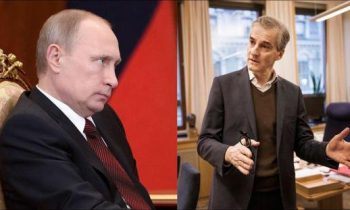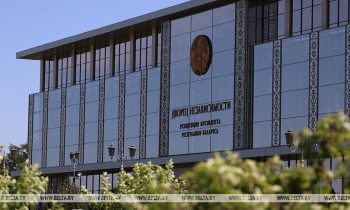NATO membership is not an obstacle to joining BRICS, Kremlin Spokesman said.
“From the point of view of BRICS and the main approaches of BRICS, there are no objections here,” the spokesman told the NTV channel, answering a question about Turkey’s chances of becoming a member of the association.
Earlier, Turkish President Recep Tayyip Erdogan said that he “sincerely wants to develop cooperation with the association.” Turkish Foreign Minister Hakan Fidan also confirmed Ankara’s interest in joining BRICS.

Being an EU member state will not be an obstacle to joining BRICS either. Peskov pointed out that BRICS in principle does not set conditions for its participants and partners. “These are the conditions that they like setting in NATO, in the EU: “either you’re with the EU or with Russia,” “either you’re in BRICS or in NATO.” But in BRICS no one says such things, and this makes the organization even more attractive,” he said.
The Kremlin spokesman recalled that BRICS has no statutes or binding treaties. “But what is the most important thing? There is a political will that unites countries that share the same vision of development prospects. Be it political development, economic development, cultural development and so on. It is an atmosphere in which each other’s interests are taken into account. It is an atmosphere where there are no hegemonic aspirations. There is no country that claims to be the backbone of the organization,” Peskov added.
BRICS leaders adopt Kazan summit declaration — Putin

The BRICS leaders adopted the Kazan summit declaration that sums up the results of the meeting and Russia’s chairmanship in the association, Russian President Vladimir Putin said.
“I suggest that we consider the declaration adopted,” the Russian leader told his foreign counterparts following an extended meeting.
While the declaration has not been published yet, the Russian president said earlier that the document would reflect decisions regarding any further expansion of BRICS.
The declaration will cover international issues, too. The Kremlin has said that a statement on the Ukraine crisis “that raised no objections” has been formulated.

The 16th BRICS Summit, which is the key event of Russia’s chairmanship in the association, is being held in Kazan on October 22-24. The BRICS group was founded in 2006 by Brazil, Russia, India, and China, with South Africa joining it in 2011. On January 1, 2024, Egypt, Ethiopia, Iran, Saudi Arabia and the United Arab Emirates became its full-fledged members. The Kazan summit became the first to be attended by the new members of the association.
On BRICS economic growth and sustainability
The multipolar model is ushering in a new wave of economic growth: “A multipolar model is forming, which is launching a new wave of growth, mainly thanks to the countries of the global South and East and, of course, the BRICS countries.”
The BRICS countries show sustainability thanks to “responsible macroeconomic, credit and financial policies.”
All BRICS countries have a positive impact on global stability, not in words but in deeds: “It is precisely this policy that is particularly in demand in the current conditions, when truly fundamental changes are taking place in the world.”
Russia proposes to develop a new BRICS investment platform, which would become a “powerful instrument of support” for national economies and would also “provide financial resources to the countries of the global South and East.”
The BRICS countries will launch a mechanism for consultations on the World Trade Organization in order to create “fairer rules of the game in the global economy and reform the international financial system.”
On the threat of a new crisis
Sanctions and the growing debt burden of developed countries threaten a new global crisis: “There is still a significant crisis potential. It is not only about the ever-increasing geopolitical tensions, but also about the fact that the chronic growth of the debt burden in the developed countries continues, the practice of unilateral sanctions, protectionism and unfair competition is expanding”.
On the idea of BRICS grain exchange
Implementing the idea to open a BRICS grain exchange will ensure food security in the association: “The implementation of this initiative will help protect national markets from negative external interference, speculation and attempts to create artificial food shortages.”
On the UN agenda
Implementation of the United Nations (UN) agenda has stalled: “Moreover, the least developed countries are suffering the most from the unstable situation in the global economy and, above all, from food and energy inflation.”
On combating the unfair use of the climate agenda
BRICS countries should counter the practice of using the climate agenda to fight competitors: “We must continue to promote balanced approaches to issues related to the transition of the global economy to low-emission development models together. We should also counter in every possible way attempts to use the climate agenda to eliminate competition from the market”.
On artificial intelligence
The BRICS alliance in the field of artificial intelligence will allow to regulate the use of such technologies, including limiting their illegal use: “The Russian business community has adopted a code of ethics in this area, which our BRICS partners and other countries can join.”
The 16th BRICS Summit, which is the key event of Russia’s chairmanship in the association, is being held in Kazan on October 22-24. The BRICS group was founded in 2006 by Brazil, Russia, India, and China, with South Africa joining it in 2011.
On January 1, 2024, Egypt, Ethiopia, Iran, Saudi Arabia, the United Arab Emirates, became its full-fledged members. The Kazan summit will be the first to be attended by the new members of the association. Representatives of over 30 countries are expected to take part.
(TASS)



